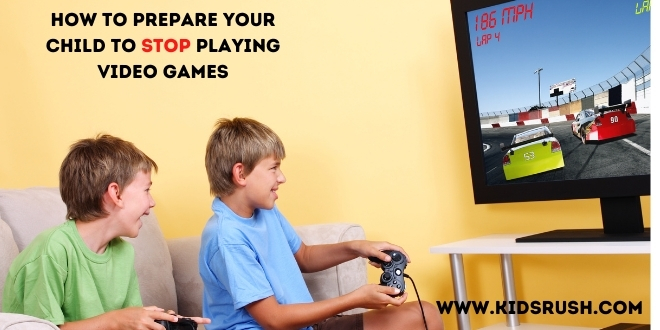How to prepare your child to stop playing video games:
Most kids love video games. While these types of entertainment can be educational or build several skills, you will notice that many children spend several hours with a controller in their hands. Video games have been linked to cognitive problems and childhood obesity. That said, you don’t have to take them out of your child’s life entirely, but it’s important to set boundaries and help them identify other activities that they can enjoy that will allow them to limit their time. ‘he switches to playing video games. In this article on kidsrush.com, we will tell you how to get your child to stop playing video games.
Set clear limits to prepare your child to stop playing video games

Put specific rules in place
You must be clear, well-established rules for changing your child’s behavior. By telling him exactly what you want, he will know what is expected of him, thus eliminating any uncertainty. You should also make sure to indicate the consequences that would result from not following the established rules. So take the time to sit down with your child to discuss the new rules you have established [1]. We recommend you to read our article Physical inactivity in children |A growing epidemic|.
- Avoid expressing yourself in the following way: “you can only play video games for a few hours a day and you must refrain from going at late hours”. This statement is not at all precise, and instead, you can say this: “On school days you have the opportunity to play video games for an hour, and you are not allowed to do so at school. – beyond 8 p.m. ”.
- Expect negative reactions. This kind of reaction is quite natural, especially when no limit was set before. You will probably notice that your child will have tantrums, plead, whine, say very harsh words, or even make threats. Stay calm, ignore outbursts if possible, and reaffirm the consequences that will come from his bad behavior.
Be clear about the consequences
Your child needs to be well informed about the consequences that will follow when he breaks the rules. You need to make sure that you bring these to his attention and that he understands them when you set the rules. Avoid being imprecise, because this will simply confuse [2].
- For example, you can talk to him in the following way, “If you don’t over-act or show no temper when you turn off your video games, and if you don’t play after 8 p.m., you can continue playing for a while. an hour each day of school. In case you create problems, that is to say, that you play after 8 pm or for more than an hour, know that you will not be able to enjoy your games the next day ”.
Apply the consequences
After setting the limits and establishing the consequences that follow, you need to be able to apply them. If you let your child get away with it easily without applying the consequences when they break the rules, know that they won’t take you seriously or obey the rules you make. You must therefore be careful to stick to what you said when he does not comply with the established rules [3].
- Make the effort to apply consistent consequences. There may be times when you might be tempted to be lenient when a child is adorable, or be demanding if they are cheeky. However, the consequences must be clear and predictable. This doesn’t mean that you can’t change them, but you should avoid doing it without clearly stating this in advance, and don’t change everything out of emotion.
- Keep in mind that video games do not necessary for the well-being and health of your child because they can be completely removed. At times, parents forget that games can be deleted entirely when a child fails to cope with the limits.
Use a stopwatch

Using a stopwatch and warning your child will help them prepare for the end of their time. Children may be resistant to change, even if they know it is imminent. Being warn that the time allotted to them is almost over will help them make the transition [4].
- Let your child know when they have 10 to 15 minutes of play left.
- Set a stopwatch five minutes before it ends. When it rings, you can tell it this: “you have five minutes left, it is time to record your game”.
Insist that he do his homework and chores
You should be able to insist that your child do all of his or her homework, chores, or any other responsibilities assigned to them every day. Before being allowed to play video games, your child must complete their responsibilities, which include household chores and academic homework. Once all of this has been done, he may then be granted permission to start enjoying his playing time.
- You need to help her see video games as a reward for completing her daily household chores and homework.
- Expect your child to resist you first if this rule is not yet in place in your household.
Install the video game console in a common room
One of the best ways to set limits on and control your child’s play is to place the system in a common room rather than their bedroom. This way of proceeding makes it easier for you to apply the rules and forces your child to follow them.
- Placing a game console in your child’s bedroom gives them way too much freedom to play without being supervised. Also, it might cause him to be tempted, especially for a young child who has trouble following the rules.
Read Also: Mental illness in children and its symptoms
Helping your child’s transition to prepare your child to stop playing video games

Collaborate with your child
You need to be able to collaborate with your child on helpful techniques to quit playing video games. Involve him in the process of limiting his games. Take the trouble to discuss not playing some games that take too long on a school night or that will be too exciting. You can also set up a reward system for respecting the rules established about video games.
- For example, you can tell him not to try to beat a level when he doesn’t have time. Instead, he can book this kind of party for the weekend.
- You and your child can think about the different rewards to be had when the set rules are followed for a week, a month, or more. Avoid giving more playtime as a reward. Instead, find better rewards that you both agree on.
Consider gradually reducing the time spent on video games
Instead of getting rid of video games entirely, consider gradually reducing your child’s playtime. For example, if after class he spends most of the time playing, you can reduce that to an hour or two first. Explain to him the reasons why you did this first, but also let him know that you respect the fact that he enjoys the hobby and that you still want him to play.
- You can say the following words: “you get really angry when I ask you to stop playing video games. Your grades have fallen over the past few months because of this. This state of matters is unacceptable. I want you to enjoy it, but we will have to limit your playing time per day ”.
- Cutting off access to video games first will undoubtedly have repercussions. You need to make sure that you limit your child’s behavior, don’t try to completely deprive them of something they like to enjoy.
Set up a transition program
It can be difficult to break video games out of your child’s habits, and your child may not be able to adjust to this new mode immediately. You need to help him by allowing him to enjoy physical activity that marks the end of his playing time. This may allow him to get used to a life without video games.
- For example, you can try a specific language that indicates a change. You can put forward the following words: “You are invited to leave the land of the imaginary for the real world! Nice to see you again! “.
- Create a physical indicator. Give your child a glass of water, do a few jumps or stretch with him.
Spend time with the family

You can successfully keep your child away from video games by planning to have some family time where everyone is together for an activity. Time spent with the family should not be optional, and it is important that every member, including children and parents, can be present.
- Sometimes you need to give your child the choice of what activity to do so that they feel like they are doing what they want to do. Forcing him to do things he doesn’t want can still frustrate him.
- You can also ask her to help you prepare dinner and make family dinners a ritual.
- Take walks or go cycling together. You can also play card games, board games, or organize a family movie night.
- You may need to define penalties that will be imposed when your child does not participate in family activities. For example, this sanction can be reduced to the fact that he will not be able to enjoy the hour of video games to which he is normally entitled.
Help him learn to save his progress in the game
Some young children are unfamiliar with exploring the game features and therefore may need help saving their progress. If he manages to save his game and doesn’t feel that all his efforts were wasted, he will be less inclined to annoy you when it comes to ending his game session.
- Explain to your child that it can take tens or even hundreds of hours to complete some games, which means the game may not be completed in one game. So you have to help him understand that his sessions should be spread out.
- You can also make this a learning activity and ask your child to tell you more about the game. Have him or she explain the different levels and challenges that are included in it as well.
- When the time allotted to him is up, you will have to wait until he reaches a level where he can save his game, and help him if he is too young to do it himself. If he tries to extend his game by taking too long to save, the best thing you can do is subtract the extra time from his playing time the next day. If you notice that this kind of behavior continues, then deprive it of its privileges for breaking the rules.
Encourage other interests to prepare your child to stop playing video games
Encourage your child to do other activities
Video games are just one of many ways kids can be entertained. There are plenty of other things they can do, especially when they aren’t allowed to fall back on video games. You should encourage your child to engage in other activities, and if he has no more ideas, you can give him some suggestions.
- For example, he may play with other toys, make music or movies, set up plays, play outside, read, get involved in doing something creative like writing, drawing, playing card games or society, or even indulge in crafts.
- Don’t be afraid to say no to your child when they want to play video games because there is “nothing else to do.”
- You should make sure that you do not use video games to mother your children. You can get into this habit very quickly without even realizing it.
Make sure your child is involved in social activities
Playing is a solitary activity. So you can encourage your child to participate in group activities that are convenient for him. Think about it together and allow him to choose the activities that will appeal to him rather than having you decide for him.
- You can try to integrate it into associations of young people who work within your religious institution. There are also community art centers and libraries that offer programs for young people.
- Look for arts programs at the local level that are aimed at music, drawing, theater, and painting. You also have the opportunity to explore elaborate projects for construction, computers, and other hands-on activities.
- Recreational sports can be recreational for some children, but you should avoid forcing yours to practice something they don’t want.
Encourage your child to get involved in physical activities
Over-playing video games have been linked to conditions like childhood obesity because this kind of entertainment is considered a sedentary activity. To get your child to be more active, you need to encourage them to choose a physical activity that they love to do. It is of the utmost importance that you can let him choose what suits him. Encourage him to try new activities in case he has no preferences.
- For example, he may enjoy dancing, biking, swimming, martial arts, skateboarding, recreational sports, and playing games outdoors.

Assess your child’s situation
Set a reasonable amount of time for video games
Each person has a different opinion about what is acceptable about video games. So you need to be able to determine a reasonable amount of time to spend playing games each day or week. Some parents limit this to one hour per day, while others ban video games altogether during the school week and only allow a few hours for it on weekends.
- There are development specialists and health professionals who recommend that children should not spend more than two hours a day in front of the computer or television. You should therefore take this into account when determining the time limits you want to set as well as when deciding on a reasonable amount of time to devote to video games.
Familiarize yourself with the warning signs that indicate addiction
Some children develop a real addiction to video games. They exhibit physical, emotional, and behavioral symptoms such as distancing themselves from friends and family. It is therefore important for parents to learn to recognize the signs and symptoms so that they can be identified when they notice this in their children.
- For example, your child may be unable to stop playing, may get angry or aggressive when not enjoying their entertainment, or showing no interest in all other activities. He may be irritated or depressed when not playing video games. Children may even neglect their hygiene, experience wrist pain, back pain, or have trouble sleeping.
Contact a healthcare professional if you notice any problems
If you find that your child is developing a video game addiction and you have tried to limit this behavior to no avail, you may need to seek professional expertise. You can work with your child’s psychiatrist or doctor to successfully change their behavior positively and to enforce boundaries.
- This decision might be a good option if your child is reacting violently to the limits you place on their access to games. If he is aggressive, threatening, or violent because you are trying to get him to change his behavior, be aware that he may need to be seen by a psychiatrist.
References
- https://www.additudemag.com/is-your-child-addicted-to-video-game/
- https://www.additudemag.com/is-your-child-addicted-to-video-game/
- https://www.empoweringparents.com/article/does-my-child-have-a-video-game-addiction-how-to-set-limits-around-video-game-use/
- https://www.additudemag.com/prevent-screen-time-addiction/

